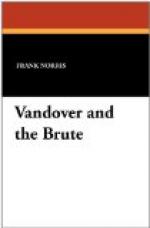As he had foreseen, Vandover had returned again to vice, to the vice that was knitted into him now, fibre for fibre, to the ways of the brute that by degrees was taking entire possession of him. But he no longer found pleasure even in vice; once it had been his amusement, now it was his occupation. It was the only thing that seemed to ease the horrible nervousness that of late had begun to prey upon him constantly.
But though nothing could amuse him, on the other hand nothing could worry him; in the end the very riot of his nerves ceased even to annoy him. He had arrived at a state of absolute indifference. He had so often rearranged his pliable nature to suit his changing environment that at last he found that he could be content in almost any circumstances. He had no pleasures, no cares, no ambitions, no regrets, no hopes. It was mere passive existence, an inert, plantlike vegetation, the moment’s pause before the final decay, the last inevitable rot.
One day after he had been living nearly a year at the Lick House, Adams & Brunt, the real estate agents, sent him word that they had an offer for his property on California Street. It was the homestead. The English gentleman, the president of the fruit syndicate who had rented the house of Vandover, was now willing to buy it. His business was by this time on a firm and paying basis and he had decided to make his home in San Francisco. He offered twenty-five thousand dollars for the house, including the furniture.
Brunt had several talks with Vandover and easily induced him to sell. “You can figure it out for yourself, Mr. Vandover,” he said, as he pointed out his own calculations to him; “property has been going down in the city for the last ten years, and it will continue to do so until we can get a competing railroad through. Better sell when you can, and twenty-five thousand is a fair price. Of course, you will have to pay off the mortgage; you won’t get but about fifteen thousand out of it, but at the same time you won’t have to pay the interest on that mortgage to the banks; that will be so much saved a month; add that to what you could get for your fifteen thousand at, say, 6 per cent., and you would have a monthly income nearly equal to the present rent of the house, and much more certain, too. Suppose your tenant should go out, then where would you be?”
“All right, all right,” answered Vandover, nodding his head vaguely. “Go ahead, I don’t care.” He parted from his old home with as much indifference as he had parted from his block in the Mission.
Vandover signed the deed that made him homeless, and at about the same time the first payment was made. Ten thousand dollars was deposited in one of the banks to his credit, and a check sent to him for the amount. The very next day Vandover drew against it for five hundred dollars.




